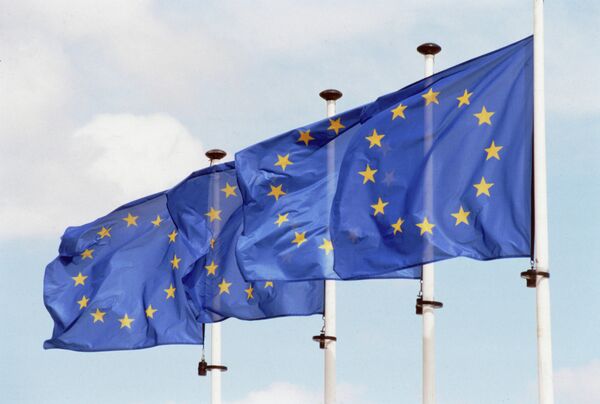MOSCOW, July 25 (RIA Novosti) – The European Union still plans on maintaining full-fledged cooperation with Russia but Moscow and Brussels have currently become hostages to the crisis in Ukraine, EU Ambassador to Russia Vygaudas Ušackas told RIA Novosti on Friday.
“Of course we’re set. We have always said that there is no better natural partner in the economy or in policy than Russia and this is not just because we share the same continent and general history,” Ušackas said in an interview.
The diplomat said that Moscow and Brussels “would be much more successful in their cooperation if we create a common economic space from Lisbon to Vladivostok.” He said, however, “we are currently hostages of the crisis in Ukraine.”
“We should acknowledge that at the moment we are hostages of the crisis in Ukraine. Until we find common approach and take certain steps which would lead to stabilizing the situation in Ukraine, it will be very difficult to return to this positive agenda that will be beneficial to everyone,” Ušackas said.
“I hope that such deliberations take place in Moscow. But unfortunately, at the moment, negative emotions over the conflict in Ukraine prevail,” the diplomat said.
Ušackas said the evaluation of the current Ukrainian conflict remains “one of the most difficult problems” affecting relations between Russia and the European Union at the moment.
“Until a common approach on resolving the conflict in Ukraine is found, it will be hard for us to return to the positive agenda of the day,” he said, adding that the EU’s stance is based on the fact that Ukraine is an independent state that is capable of taking decisions on relations with other countries.
Despite current tensions, the European Union still seeks mutually beneficial cooperation with Russia which it considers as a “natural partner both in economics and politics.”
EU Council’s Committee of Permanent Representatives on Thursday agreed to add further Ukrainian and Russian persons and entities to the list of those subject to an asset freeze and a visa ban over their role in the Ukrainian crisis.
EU ambassadors are also to discuss proposals "on further targeted measures and proposals for taking action, including on access to capital markets, defense, dual use goods, and sensitive technologies, including in the energy sector" at their next meeting on Friday.
“We’ll see how broad this list will be. Let’s wait,” the diplomat said adding that the EU takes decisions itself although the criterion and content of these decisions are close to those of the United States.
“The mere fact that the EU adopts sanctions against Russian officials is abnormal,” he added.
Speaking on the possibility that the EU could soon lift the sanctions against Russia, the diplomat said: “Everything in this life is temporary, and so the sanctions are. When they are taken, they are announced for a temporary term, they can be either extended or lifted.”
“Sanctions are not the ultimate goal. The goal is to influence the steps of our partners. The fact is that in the 21st century we use sanctions against Russia, I wonder what further steps are.”
Ušackas said as the EU ambassador to Russia he is disappointed by how the bilateral relations have been developing in the past four or five years. “At the same time, I hope we will leave this crisis stage through the inevitable process of restoration of confidence between us and finding understanding while settling the problems around Ukraine and our bilateral relations.”
This could help Russia and the European Union to resume to normalizing ties and work on the further summit. The previous summit was held in late January 2014 in Brussels.
The diplomat said he hopes that the sides will start again holding high-level meetings and summits but the current crisis in Ukraine prevents Russia and the EU from taking a decision to gather for a summit now.
According to Eurostat data, Russia is EU’s third largest trading partner, following the United States and China. Russia accounts for 7 percent of total imports and 12 percent of total exports in the EU.
Moreover, many European countries have strategic partnerships with large Russian companies and heavily invest in joint projects.




